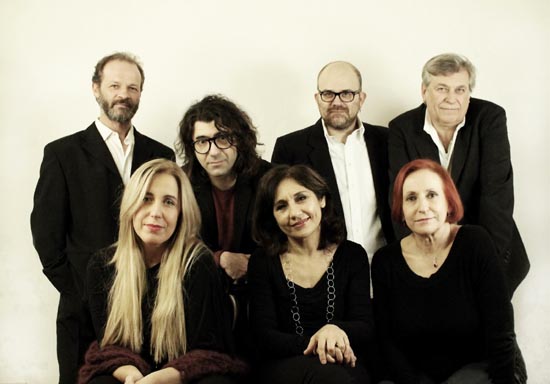|
Bella Ciao
|
|

Riccardo Tesi, Lucilla Galeazzi, Elena Ledda,
The new album version of Bella Ciao, supervised by accordionist extraordinaire Riccardo Tesi, celebrates the fiftieth anniversary of that seminal show. Tesi gathered together major Italian folk and political artists for this event, and the musical component of the songs has been updated to include guitar, accordion, clarinet, bass, and percussion. The show has thus been fleshed out, but just enough to keep the songs in a fond caress.
Bella Ciao both begins and ends with the sounds of workers laboring in a marble quarry, with workers hitching the marble slabs for transport. This is dangerous work – but again, so are the songs. The laboring songs honor the work of textile spinners, coal workers, rice field workers, and olive harvesters. “Porta Romana” is a prison song, and the reconstituted Bella Ciao musicians dedicate the song to the migrants caught in Italian prisons. Many of the other songs offer political statements: “La lega” was a popular song amongst the peasantry, and is here sung with the intent to stress the original meaning of lega (league) as aligned with liberty, as opposed to the xenophobia of the far-right Lega Nord. And, of course, there is “Bella Ciao,” the most famous of the Italian partisan songs, still powerful in its anti-fascist sentiment.
The singing on Bella Ciao is fantastic; the women are all masters of folksong and social singing. But overall, while the album is beautifully performed and a fine tribute to the original production, the professionalism overshadows the stakes of these songs. For songs that originated with the people, their ragged nature and outrage has been buffed to a polite sheen. The contrast with the cries of the marble workers is notable. In a time when the 99% are straining under the 1%, the words of the songs can still have tremendous impact; but, the songs should not have the impact of nostalgia when today, we need action and the shock of the avant-garde to wrest people from their torpor. - Lee Blackstone Further adventures Read a review of Mauro Palmas' A Volte Ritornano Listen to The Modena City Ramblers' version of "Bella Ciao."
© 2016 RootsWorld. No reproduction of any part of this page or its associated files is permitted without express written permission.
|
|
|
|